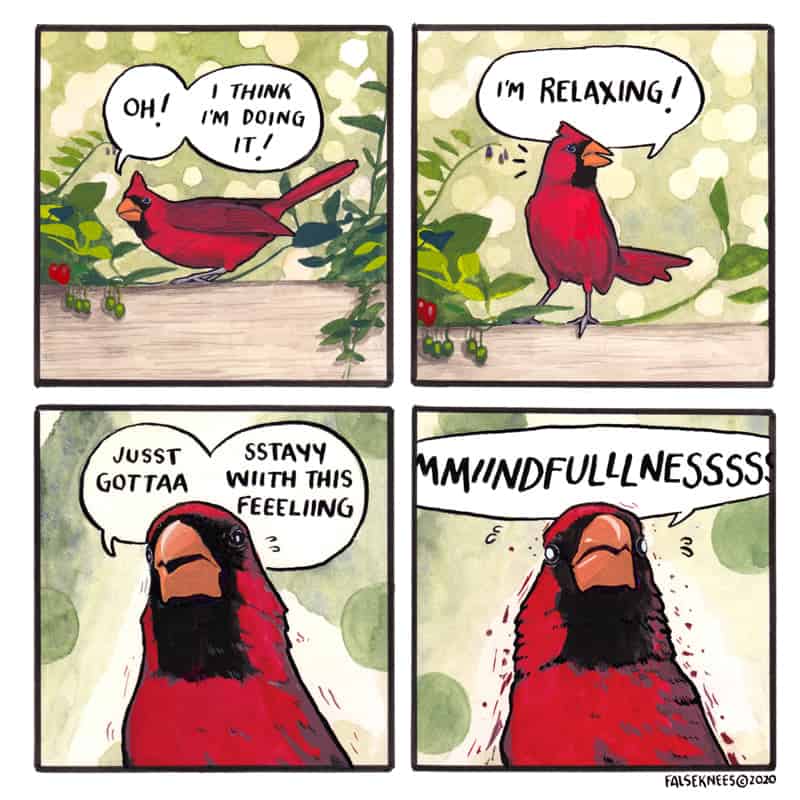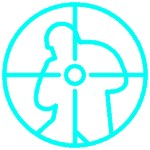You can’t trip over a yoga-mat these days without hearing someone say something about “being mindful”, but…
📺 BREAKING NEWS 📺
Most people don’t know what the hell “mindfulness” is.
So here's a definition you can use to impress people at cocktail parties:
Mindfulness is when you wedge your awareness under the diamond anvil of the present moment and watch the unsavory, beautiful, salacious, hilarious, and other miscellaneous thoughts and feelings parade through your skull while holding a mental pennant that says "no judgment."

It’s good news that more humans are getting into mindfulness – which is fundamentally about being the opposite of unconscious.
I’ll go out on a limb and say that being conscious is important.
You can’t live your #bestlife in a perpetual coma.
There are now over 3000 studies showing that mindfulness is the most important juju for improving mental focus, lowering stress, enhancing emotional intelligence, and improving overall cognitive function.
According to many researchers, the evidence for the effects of mindfulness and meditation on the human brain is “robust.” And those are strong words coming from scientists who make an olympic-sport out of using qualifiers.
Now that we're all better than most people at knowing about non-judgemental states of awareness...
Here’s a few more knowledge-bombs about awareness and the brain
The two main meditation types for leveling-up awareness are...

Focused Attention
With focused attention meditation, you literally “focus your attention.”
Good job if you guessed that.
Just practice immersing your focus on one thing. Anything at all. The "object of focus" could be a specific sound, object, or experience like watching or counting your breath.
When you do this, you'll find that your brain will have a hard time shutting the f*ck up. You'll never "win" this battle, so don't get frustrated when you don't. Just notice when your brain interrupts, chill, rinse-and-return your attention.
Why use this meditation technique?
Studies show you'll gain greater control over your emotions and your ability to concentrate on your work or anything else.
The more you do it, the stronger your brain will be wired for mental focus - and the less the wires will fray.


Open Monitoring
With open monitoring meditation, you take a bit of the opposite approach to focused attention training.
You get to be your brain's observant yet permissive parent.
No need to manage anything. Just notice shit.
Let your mind wander and daydream while also paying non-judgy attention.
Observe all the different thoughts, feelings, sensations, or memories that constantly flow in and out of your conscious awareness.
What happens when you practice open awareness? In this brain-state, the neurological disco-ball of your brain's intuition, creativity, and problem-solving skills can sparkle bright oval insights on the roller-rink of your life.
You can cook up specific neurological and cognitive benefits with specific forms of mindfulness meditation.
Which of these meditation types is best for you?
Depends on what’s going on with you… but why not mix em’?
Mixed together, they can increase your ability to blend states of awareness and relaxation like a bad-ass warrior-monk.
By blending up these different approaches to mindfulness to your taste, you both power-up your ability to wield the creativity of your wandering mind like nunchucks AND improve your ability to compassionately punch daydreaming if it starts distracting you from your goals.
In short, when you quilt these techniques, you’ll be awarded a metaphorical loom of awareness – and cultivate an artistry to weave different ways of being yourself at will.
You’ll be able to play beautiful neuroelectrical patterns like a keytar – jammin’ through tasks and bucket-lists while humping the air – with or without a head-turning mullet.

Dive Deeper
Focused attention, open monitoring and loving kindness meditation: effects on attention, conflict monitoring, and creativity – A review
Dominique P. Lippelt, Bernhard Hommel, Lorenza S. Colzato
Front Psychol. 2014; 5: 1083. Published online 2014 Sep 23.
Meditate to create: the impact of focused-attention and open-monitoring training on convergent and divergent thinking.
Colzato LS, Ozturk A, Hommel B.
Front Psychol. 2012 Apr 18;3:116.
2-3X Your
Learning Speed

The Best Way to Access Your Creativity
It is a common misconception that creativity is like some sort of creature from alternate dimension that needs a proper

Want More Happiness? Just Stay Alive and Lower Your Expectations
Researchers have been flip-flopping for decades on whether happiness and age go hand in hand. But, in 2013 Scientific American

The Neuroscience of Prejudice
Hard to swallow pill: Prejudice is rooted in human nature. Our minds naturally divide and categorize, favoring one group over

How to Kill Burnout and Upgrade Your Performance the Easy Way
Another day of feeling like a complete failure because you can’t manage to get out of bed. It’s a fun


I have been browsing online more than three hours today yet I never found any interesting articles like yours. In my view if all website owners and bloggers made good content as you did the internet will be a lot more useful.